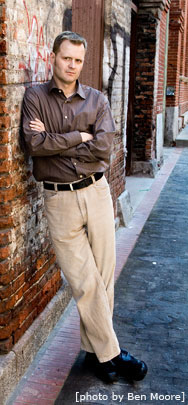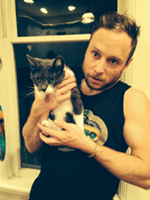Self-Publishing in Today's Marketplace:
Jake Hólm in Conversation
with David Leach

Malahat volunteer Jake Hólm talks with David Leach about his role as moderator for Vanity or in the Vanguard: Self-Publishing's Makeover, one of four interactive panel discussions at this year's literary symposium, WordsThaw. Panelists include Mary Hughes, Patrick O'Connor, and Sid Tafler.
This panel will take place Saturday, March 21, 1:30 - 3:00 p.m., at the University of Victoria.
See the WordsThaw website for details on this and other panels, and to purchase tickets.
Would you consider the following statement to be fact, fiction, or thoroughly complicated: An increasingly robust array of cheap networking and marketing options available via the inter-web, coupled with the growing acceptance (and, often, celebration) of grassroots and "independent" projects, has resulted in prime conditions for those writers interested in self-publishing.
I choose Door #3: "thoroughly complicated." It's true that the digital era offers authors the technical means to publish their words and stories with minimal mediation and maximum potential readership. As Internet guru Clay Shirky declared of publishing: "That's not a job anymore. That's a button." However, every generation—with the historical amnesia of youth—fetishizes its own invention of "indie art." Sorry, kids. Gutenberg was the original self-publisher—and authors have always exercised their option to go it alone, even in the heyday of corporate book publishing. They've issued chapbooks and started their own presses and zines when so-called "mainstream" publishers rejected their words. Also, the new potential to network and market yourself cheaply online doesn't make you a better writer. In fact, it takes away from the long, lonely hours of revision that ultimately hone your craft. And the "unbundling" of the publishing industry often removes one of the most vital and overlooked elements of good writing: the experienced editor who coaxes the best possible book out of a writer. We still remain under the thrall of the myth of the Romantic genius, spinning art out of thin air. The truth is: most books are a long and complex creative collaboration, even when only one name appears on the dust jacket. Self-publishing ought to avoid self-editing. So, yes, we now have prime conditions for self-publishing. But are these the conditions that will let writers achieve the most from their creative vision? It remains to be seen.
Of course the flip side of online self-publishing is that those writers who are braving "the long, lonely hours of revision," and publishing in more conventional arenas, are competing with that much more material. Have you noticed much bitterness among contemporary writers towards the internet revolution and its effects on publishing and/or the industry in general?
Yes, literary authors are sometimes skeptical of the benefits of the Internet, but it's got nothing to do with self-publishing and a lot to do with the economic transformation of the publishing and book-selling business. And the elephant in the room has a name: Amazon. Amazon's practice of using books as a loss leader for its larger aspirations as a kind of virtual WalMart has decimated independent book stores, who have long supported up-and-coming authors, and pressured traditional publishers to bend to the Internet giant's demands. Self-publishing authors have benefitted—for now—from Amazon's global platform to sell their e-books online and reach an audience of Kindle users. But the authors who succeed in Amazon's e-book ecosystem tend to be genre writers—horror, sci-fi, and especially romance—who trade in volume rather than artistic quality. You can make a living there, if you can write five books a year and sell them to a fan base; you can't if you need five years to craft a new novel or memoir that explores new territory in your genre. Authors have good reason to be suspicious of any "Internet revolution" if it results in a single corporation dominating how books, whether print or digital, reach new readers.
Wow, this is troubling to hear. One can imagine would-be writers (the generic trailblazers you speak of) opting to direct their creativity elsewhere, for fear of meager compensation in today's industry. Even the willfully starving artists need to eat at some point, right? Are you aware of any organized effort to undermine this trend in publishing?
I don't think anyone who tells stories for art's sake is in it for the money. The compensation has always been meager—just think of Dostoevsky hustling to finish the next chapter of his novels to pay the bills. Few Canadian writers make a living purely off their publications; the recent success of Hachette to set its own e-book prices versus Amazon's bullying was a "victory" of sorts. And there are alternative models of self-publishing popping up, like the Nonvella series of creative nonfiction and literary journalism works out of Vancouver. Also, the rise of e-books and e-readers seems to be leveling out, as readers choose digital for some types of reading but still prefer paper for other forms. I'm a glass half full kind of writer in the end. Despite the economic challenges of publishing in the digital age, there has never been a better time to reach readers around the world with your words—and even to build an audience and engage in a conversation with them about your literary creations after publication. Of course, I could be wrong. Maybe people will stop reading entirely and instead get sucked into new forms of immersive narrative and virtual reality in the coming years. But I doubt it.
Thank you for your insight on this topic. In closing, could you perhaps offer some parting advice to writers who are considering self-publishing? You've already mentioned that one ought to avoid self-editing—any other guiding principles you would recommend?
The goal of the creative writer remains the same as it has always been, even before such "disruptive" technologies as the printing press and the typewriter, let alone the Internet: to tell stories that matter to readers and create new patterns of meaning in their minds, to bend language into unexpected and previously unseen new forms and combinations. We spend a lifetime getting better at this.
How you get your words into readers' imaginations is what technological change most affects. Self-publishing offers one more option for writers to share their stories and their literary visions. I think it's foolish to prescribe one-size-fits-all tips or try to predict the future of publishing. Every writer must chart her or his own path. But I do think it helps to get out of the garret mentality of the Romantic literary loner and cultivate a community of fellow writers and readers who can help you along the journey to be both a better and a more widely read writer. "Only connect," as E.M. Forster famously wrote. If new digital tools of self-publishing can forge those new connections, then more power to them—and the writers who use them.

Jake Hólm
* * * * * * * *









